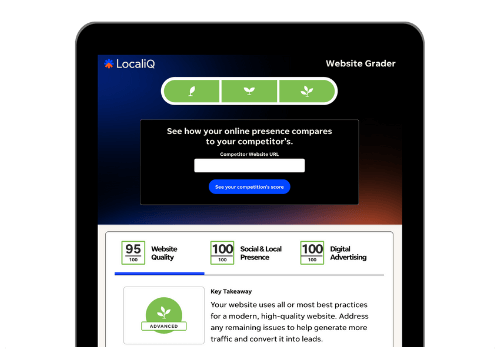When you think of a recession, considering your marketing plan is probably not your top priority. You’re likely more focused on the well-being of your family, your business, your friends, and your employees — as it should be.
But, the fact of the matter is that marketing your business is essential for growth, even (and maybe especially) when the economy takes a dip.
Financial woes, whether they relate to taxes and regulations or the uncertainty of the economy, make up the top five concerns for most small business owners. And that’s the case even when the economy is in good shape.
It’s important to think about your marketing plan in a slow economy so you’re prepared and set your business up for as much success as possible.
Here, we’ll cover all that you need to know about marketing during a slow economy or a recession and how you can be prepared for whatever the economy throws your way.
What to Know About Marketing + the Economy
Ah, marketing. Obviously, it’s something I think about every day (because it’s my job, and I love it), but it might not be something that’s always on your mind — and that makes sense. You have a lot going on when you’re running a business, and marketing is just a small portion of that.
So, why do you need to think about a contingency plan for your marketing if the economy slows?
Marketing also provides a way for you to stand out among your local competitors, who are likely investing in marketing as well. It’s estimated that SMBs will spend more than $134 billion on marketing tactics this year alone, and that figure has only grown over the last five years. You don’t want to be left behind, even if an economic slowdown occurs.
Additionally, it’s best to be prepared for whatever comes your way. As a business owner, you likely have some plans in place in case a disaster strikes — whether that’s a natural disaster, a terrible review, your best employee quits, etc. And, you might even have a plan in place in case we do enter a recession. So, it only makes sense to include what you’ll do about marketing as part of that plan.
Like I mentioned, marketing your business is important for growth. Sure, if you scaled back all your marketing, your business would probably still keep trucking along, but you likely would see a decrease in new customers and a potential drop in your existing ones.
Let’s explore this more:
Why You Need Digital Marketing
I might be a little biased, but you need digital marketing. An effective digital marketing strategy can help your business get in front of new consumers, build a strong web presence, and connect with consumers in new, exciting ways.
With the majority of consumers searching for new businesses online, it’s important for your business to be there where they’re looking. If they’re not finding you there, it’s almost like you don’t exist. And no one wants that!
Plus, digital marketing tactics are the foundation of your online presence, including your website, local listing and review sites, and many more of the places consumers are turning to find information about new businesses.
How Digital Marketing can Help Your Business in any Economy
So, we’ve established that digital marketing is important for your business, but how can it help you in a slow economy?
Clearly, if you have the budget for marketing, it’s a no-brainer to go for it. But, if you’re on a limited budget, it can be easy to think you can cut it off without any issues.
However, as mentioned, digital marketing helps you get in front of new consumers where they’re spending time and searching: Online. So, to completely cut that off could be detrimental to your business.
There are marketing tactics you can run now, while the economy is in a good place, that can set you up for success and help you keep the lights on in the event the economy takes a dip.
For example, investing in your web presence now, like a well-built website, strong SEO strategy, and engaging social media sites can support your current marketing strategy and help you if you need to pull back on that a bit in the future.
As a further example, SEO is an essential marketing tactic if you’re hoping to get found on search engines, but it takes time to ramp up. It’s not like paid search marketing where you can turn it on and see results fairly quickly “ it’s a long-term strategy that continues building on itself. If you get your SEO ramped up now, then if we do see a recession later this year or next year, your website is already going to be in a good place.
Related: Get tips for better marketing during inflation.
What You Need as Part of Your Strategy in a Slow Economy
We touched a little bit on SEO, but what else do you need as part of your strategy in a slow economy?
1. A Great Web Presence
Obviously, building your organic web presence is important if you want to get your business in the places that consumers are spending time: search engines, apps, and social media sites.
A robust web presence includes a mobile-friendly and user-friendly website, a strong SEO strategy, an engaging social media presence, and managed local listings.
We touched on SEO, which incorporates these other tactics as part of an effective strategy. But, let’s talk about social media.
Your social media pages give you a place to build a connection and engage with your audience online. It gives users a peek behind the curtain of your business — especially if you’re regularly sharing content that highlights your products and services, your employees, and your local community.
As part of your social media strategy, you can also incorporate some different tactics, like influencer marketing. We cover influencer marketing in depth here.
2. A Lead Generation Strategy that Works for You
To build on your great web presence, it’s also important to incorporate lead generation tactics to target new audiences.
Unlike web presence activities, which work to get in front of consumers without a paid component, lead generation tactics allow you to target users based on the demographics you identify that will yield your most likely customers.
One lead generation tactic many business owners overlook when they’re on a budget is email marketing. Email marketing allows you to target consumers with attributes similar to your existing customers (called a lookalike audience) with a compelling message, offer, or information. And, we know that consumers use email. There are 5.6 billion active email accounts in the world, and 99% of consumers check their email every day.
There are plenty of other lead generation tactics that can work for any budget, including paid search marketing and targeted display advertising, but it really comes down to what works for your business.
3. A Marketing Partner
Yes, I’m a little biased, but a marketing company can act as a trusted partner in times of an economic slowdown. They can help you identify the strategy that’s going to work for your business and execute on that strategy so you can focus on the parts of your business that matter most to you.
Thinking about entering a time of economic uncertainty can be nerve-wracking. We’re not here to alarm, just to prepare. By building a strategy that’s going to lay the foundation for marketing success now and planning what tactics to focus on if the economy does dip, you can prepare your business and give yourself peace of mind now. Plus, once you build your plan, you can refine it and update it every year!
We love partnering with local businesses across the country to build marketing strategies that drive results for them. Reach out today to learn more and connect with one of our marketing experts.
Related Articles
Why You Need a Digital Marketing Budget in Any Economy
Is Your Business Recession-Proof? How Digital Marketing Can Help
Related Articles
-

27 Splashy (& Doable!) Grand Opening Ideas for Retail Stores
-

The 12 Most Effective Home Services Promotion Ideas
-

9 Bold Brand Awareness Campaign Examples (+Tips for Yours)
-

40 Best Real Estate Call-to-Action Phrases to Convert Buyers, Renters, or Sellers
-

17 Tried & True Promotion Ideas to Boost Sales


